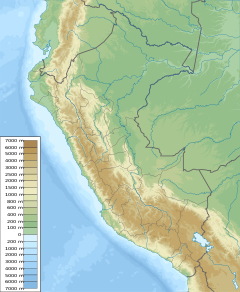Pristimantis nebulosus, also known as the Huanuco robber frog, is a species of frog in the family Strabomantidae.[1][2] It is endemic to Peru and only known from its type locality in the southern Cordillera Azul, Huánuco Region.[1][2][3]
| Pristimantis nebulosus | |
|---|---|

| |
| Preserved holotype | |
| Scientific classification | |
| Domain: | Eukaryota |
| Kingdom: | Animalia |
| Phylum: | Chordata |
| Class: | Amphibia |
| Order: | Anura |
| Family: | Strabomantidae |
| Genus: | Pristimantis |
| Species: | P. nebulosus
|
| Binomial name | |
| Pristimantis nebulosus (Henle, 1992)
| |
| Pristimantis nebulosus is only known from the Cordillera Azul on central Peru | |
| Synonyms[2] | |
| |

Description
editAdult males measure 27.7–29.1 mm (1.1–1.1 in) in snout–vent length. The head is slightly longer than it is wide. The snout is subacuminate in dorsal view and rounded in lateral profile. The tympanum is distinct, surrounded from above by the prominent supratympanic fold. The fingers and toes are long and slender. Skin is dorsally and laterally shagreen. The dorsolateral folds are weakly developed. Dorsal coloration is generally brown of different shades, possibly with orange to reddish tint. The dorsum has dark brown chevrons or irregular flecks, outlined with cream. The head has various dark-brown markings, including an inter-orbital bar. The limbs have dark brown bars. The belly is yellowish-cream while the throat is yellow or yellowish-cream, mottled with grey spots.[3]
The male advertisement call consists of a single regularly pulsed note that is repeated at a rather regular succession in short call series. The dominant frequency is 3190–3360 Hz.[3]
Habitat and conservation
editPristimantis nebulosus is known from an area of evergreen montane rainforest at about 1,650 m (5,410 ft) above sea level. The area has been altered by plantations. In 2019, specimens were found in disturbed habitat along a narrow dirt road. Males were calling from a bushy area—one male called from near the ground, while another one was sitting on a leaf some 30 cm (1 ft) above the ground.[3] Development is direct[1] (i.e., there is no free-living larval stage[4]).
Threats to this species are unknown. Its range might extend into the Cordillera Azul National Park.[1]
References
edit- ^ a b c d e IUCN SSC Amphibian Specialist Group (2018). "Pristimantis nebulosus". IUCN Red List of Threatened Species. 2018: e.T56489A111352008. Retrieved 31 August 2023.
- ^ a b c Frost, Darrel R. (2023). "Pristimantis nebulosus (Henle, 1992)". Amphibian Species of the World: an Online Reference. Version 6.1. American Museum of Natural History. doi:10.5531/db.vz.0001. Retrieved 31 August 2023.
- ^ a b c d e Köhler, Jörn; Castillo-Urbina, Ernesto; Aguilar-Puntriano, César; Vences, Miguel & Glaw, Frank (2022). "Rediscovery, redescription and identity of Pristimantis nebulosus (Henle, 1992), and description of a new terrestrial-breeding frog from montane rainforests of central Peru (Anura, Strabomantidae)". Zoosystematics and Evolution. 98 (2): 213–232. doi:10.3897/zse.98.84963.
- ^ Vitt, Laurie J. & Caldwell, Janalee P. (2014). Herpetology: An Introductory Biology of Amphibians and Reptiles (4th ed.). Academic Press. p. 166.

